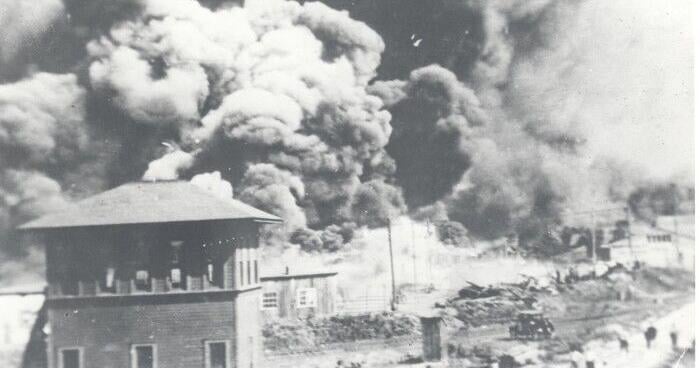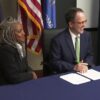
OKLAHOMA CITY — The Oklahoma Supreme Court has ended a legal journey for the remaining two survivors of the 1921 Tulsa Race Massacre.
Lessie Benningfield Randle, 109, and Viola Fletcher, 110, sought reparations for the social and economic impacts of the massacre, one of the deadliest and most devastating acts of anti-Black violence in the nation’s history.
According to the Tulsa Historical Society, as many as 300 people were killed. A 2018 article in the American Journal of Economics and Sociology estimates the Greenwood District of Tulsa, which was colloquially known as Black Wall Street, lost up to $200 million in property, in adjusted for today’s dollars.
Randle, Fletcher, and Fletcher’s younger, brother Hughes Van Ellis, who died last year at 102, sought reparations in the form of nuisance abatement from the city of Tulsa for “unlawful acts and omissions that began with the Tulsa Race Massacre of 1921 and continue to this day.”
But Wednesday, the State Supreme Court ruled the plaintiffs’ grievances do not fall within the scope of Oklahoma’s public nuisance laws.
The court’s ruling explained that a nuisance exists when an unlawful act or omitted duty “injures or endangers the comfort, repose, health or safety of others,” and a nuisance is public when it “affects at the same time an entire community or neighborhood, or any considerable number of persons.”
The court added that its legal precedent limits public nuisance liability to defendants “committing crimes constituting a nuisance, or causing physical injury to property or participating in an offensive activity that rendered the property uninhabitable.”
Based on that precedent, the court argued, the individuals who should be criminally liable for the massacre are already dead.
“Plaintiffs’ grievance with the social and economic inequities created by the Tulsa Race Massacre is legitimate and worthy of merit,” the ruling read. “However, the law does not permit us to extend the scope of our public nuisance doctrine beyond what the Legislature has authorized to afford plaintiffs the justice they are seeking.”
The court’s decision upheld a July 2023 ruling from the Tulsa County District Court to dismiss the case.
No one was ever held legally responsible for the death and destruction in Greenwood; no survivors ever received financial compensation for their losses.
“History has rendered its resounding judgment, and state law is on the wrong side of history in denying justice to the survivors of Tulsa race massacre, which the city aided, abetted, and benefited from,” said Joseph Thai, a constitutional law professor at the University of Oklahoma who frequently litigates civil rights cases.
Kacey Rhone, education director at the Tulsa Historical Society, suggested the city of Tulsa is hypocritical in marketing Greenwood and its history without compensating the only survivors of the massacre.
“These folks have waited over 100 years for some sort of justice and recompense and likely won’t see it in their lifetimes now,” Rhone said. “[The city of Tulsa] allowed white Tulsans to destroy this area. The survivors are right — the city does promote Greenwood, [but] they see nothing going toward survivors or families.”
Members of the Oklahoma State Legislature spoke out against the decision.
“Viola Fletcher, Lessie Evelyn Benningfield Randle, and the family of the departed Hughes Van Ellis, will never be able to receive their due justice in the state of Oklahoma,” said Rep. Jason Lowe, D-Oklahoma City.
The massacre was a manifestation of anti-Black violence rampant across the state, including in Norman.
In January 2020, the Norman City Council signed a proclamation acknowledging and condemning the city’s history as a “sundown town,” a municipality that excluded Black residents through local laws, intimidation or violence.
In Norman’s case, there is no public record of any African-American residing within the city limits of Norman from its founding in 1889 to 1967, an exclusion that came through extralegal agreements among realtors refusing to sell or rent property to Black people.
George Henderson, the first African-American property owner in Norman and retired dean of the College of Liberal Studies at OU, accepted the proclamation in 2020.
In his acceptance remarks, Henderson recalled in 1968, a year after he arrived, the council established a human relations committee with the intent to make the city more inclusive. Its members apologized to Henderson and his family.
“I was a brash, young professor when I came, and I said at the public hearing, ‘I need no apology. Apologies mean very little to me, my family, my friends and others, but what I need from Norman is affirmative action, and if you’re not going to do much more than apologize to me and others, you’ve wasted your time with me,’” Henderson said.
“And I remember leaving that meeting and having individuals say, ‘Thank you. Thank you for encouraging us to go beyond apologies.’”


